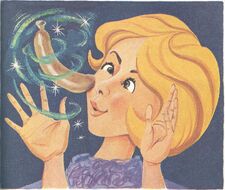
Illustration for "The Ridiculous Wishes" from the 1973 children's anthology My Giant Story Book.
"The Ridiculous Wishes" or "The Three Ridiculous Wishes" (French: "Les Souhaits ridicules") is a French fairy tale. The best known version of the story was originally written in verse by Charles Perrault and first appeared in print in the literary magazine Le Mercure Galant in 1693. It was published again in Perrault's 1697 anthology of fairy tales Histoires ou Contes du temps passé (Fairy Tales from Past Times with Morals or Mother Goose Tales).
In Perrault's version, the story's protagonist is a poor woodcutter named Blaise who is granted three wishes. Unfortunately, all three wishes are wasted after Blaise absentmindedly comments that he would like a sausage[1] to eat.
Similar tales exist in Indian, Persian and Arabian folklore.
Plot
The poor woodcutter Blaise is very unhappy because none of his wishes have ever been granted. Blaise goes out to work one day, complaining about his miserable lot. The god Jupiter suddenly appears. He tells Blaise that the first three wishes that he makes will be granted. Before disappearing, Jupiter points out to Blaise that his future happiness depends entirely on those wishes and warns him to think very carefully before asking for anything. Blaise happily hurries home to tell his wife Fanchon the good news.
Fanchon imagines thousands of ways in which the three wishes could make their lives better. She realizes, however, how important it is for Blaise to use the wishes wisely. Fanchon advises Blaise not to be hasty and says that he should not wish for anything that day. She says that he should make his first wish the following day after they have carefully thought about what they need. Blaise agrees to this and sits down to relax in front of the fire.

The huge sausage slithers towards Fanchon and Blaise. 1922 illustration by the Irish artist Harry Clarke.
While happily relaxing in front of the fire, Blaise says that what he would like at that moment would be to eat a sausage.[1] Fanchon notices an enormous sausage appear from a corner by the fireplace. The sausage slithers across the floor like a snake and slowly advances towards Fanchon and Blaise. Fanchon realizes that the sausage has appeared because Blaise wished for it. She gets angry with her husband, who could have wished for an empire, jewels or fine clothes but who wished for a sausage instead. Blaise admits that he made a mistake but says that he will make better use of the other wishes. Fanchon continues to complain and calls Blaise a fool. Blaise then angrily says that he wishes that the sausage was on Fanchon's nose. His wish is granted. The sausage becomes attached to Fanchon's nose, giving the previously attractive woman a strange and ugly appearance.
Although Blaise could still wish to be a prince or a king, he realizes that Fanchon could not be a princess or a queen with a sausage on her nose. He uses the last wish to wish for the sausage on Fanchon's nose to disappear. Consequently, at the end of the story, Blaise and Fanchon are back in the same condition in which they were in at the start. They have missed out on the opportunity to become rich and powerful.
According to Perrault, the moral of the story is that rash and careless people such as Blaise deserve to be miserable because they are incapable of using the talents with which they were born.
See also
Footnotes
- ↑ 1.0 1.1 In the original French text, the word boudin is used. This is sometimes translated as "black pudding" rather than "sausage".
External links
- Versions of "The Ridiculous Wishes" in French and English on Wikisource.
- Fan-made French-language audiobook of Charles Perrault's "The Ridiculous Wishes" on YouTube.
- Public domain English-language audiobook of Charles Perrault's "The Ridiculous Wishes" on YouTube.
